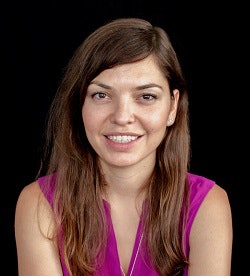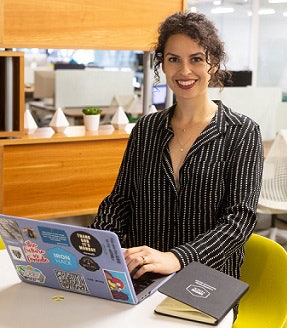Ironhack, a Miami-based global coding bootcamp that feeds women and underrepresented minorities into the STEM pipeline, has garnered the 2019 Facebook F8 Scholarship to aid efforts to diversify tech fields.
The $250,000 award will launch the Digital Creators Fund, a collaboration between Ironhack and Facebook. It will help 50 students afford the bootcamp, which offers certifications in web development, UX/UI design and data analytics.
“We all know the tech industry has a diversity problem and that it’s not an easy one to fix,” said Ironhack co-founder Ariel Quinones. “Diversity and inclusion are not just buzzwords. They are crucial to our economic progress and should be a business imperative for all employers. We are honored to collaborate with a leading tech employer like Facebook to promote diversity in technical roles. We know that while opportunity is unevenly distributed, talent is not. Through these scholarships, many Ironhack students of diverse backgrounds will be able to take their first step towards a rewarding career in the tech industry.”
 Alina Kitaeva
Alina KitaevaGiving money is one way Facebook – which is worth more than $500 billion – supports access to STEM education for women and underrepresented minorities, including working adults who want to switch to a STEM career, said Ime Archibong, the social media platform’s vice president of product partnerships.
“We have the unique opportunity and responsibility to ensure inclusion and diversity in our industry,” said Archibong, a Nigerian American. “Removing the financial barrier to pursue a new career in tech is critical to these efforts.”
Students wishing to start the Miami bootcamp in the fall can apply for a scholarship through May 31, and full and partial awards will be made, said Alia Poonawala, Ironhack Miami’s general manager.
The bootcamp costs $11,500 and can be completed in nine weeks full-time or 24 weeks part-time. Students have ranged in age from 18 to 55 but typically are ages 20 to 30, Poonawala said.
In addition to their instructors, students interact with outcomes managers and career coaches who prep them for employment interviews and help them find jobs, Poonawala said.
Ironhack has more than 600 partners who provide support ranging from funding to job placement, said Poonawala. Uber recently gave $300,000 for scholarships over two years, for example, and graduates have gone on to work for companies ranging from the BBC and Google to General Electric and Royal Caribbean.
“Our focus is to be an outcomes-based educational institution,” said Poonawala. “Employers care about a portfolio, and we focus on project-based work, learning by doing.”
Since opening in 2013, Ironhack has graduated more than 3,000 bootcampers. Two-thirds are Black or Hispanic and 31 percent are female, while nearly nine in 10 graduates land a job in their field within six months of graduating, said Poonawala.
 Alia Poonawala
Alia PoonawalaThe main campus and headquarters are in Miami, where about 80 percent of students are from south Florida. Ironhack offers similar bootcamps in Amsterdam, Paris, Berlin, Munich, Madrid, Barcelona, Lisbon, Mexico City, Bogota and Sau Paulo.
Most Ironhack students plan to make a career change into a tech field, said Poonawala.
Alina Kitaeva was one of them. After earning a bachelor’s degree in Russia and studying marketing in a graduate program in New Zealand, the Ft. Lauderdale resident got a job in marketing.
But she decided she would prefer the creativity of devising tech solutions for various fields such as health care and education. She was riding in an Uber in January 2018 when she saw an ad about the rideshare company’s partnership with Ironhack to provide bootcamp scholarships to Uber riders and drivers, “and the rest is history,” she said.
The convenient location of Ironhack’s Miami campus was a selling point, said Kitaeva, who had ruled out tech bootcamps in New York and the San Francisco bay area because they were too far away.
She was working full time when she began Ironhack’s web development program part-time, and eventually switched to full-time status.
“That was better,” she said. “It’s a deep dive and you get immersed in that world and lifestyle. The curriculum is continuously updated and they teach you what is actually relevant.”
She said she also benefitted from learning about and engaging with online tech communities, social activities at the school and connecting with other Ironhack students and alumni from around the world.
When Kitaeva finished last summer, she took a break for a few months before accepting a contract job at Miami-based BetaBlocks, where she is now a full-time software engineer.
“I love the staff of Ironhack,” she said. “Even though the program is short, I loved the professionalism and involvement of the teachers and the outcomes manager. It was a very extraordinary experience for me. I never had an educational experience like that. They really help you transition from one field to another.”
“It’s a really awesome opportunity for somebody looking for a fast-track transition into a technical field,” she added.
Ironhack is designed to promote access, persistence and employment, so a reasonable cost and scholarships are keys to attracting the low-income and underrepresented minorities – often first-generation students – they seek to serve, said Poonawala.
“Once you remove that financial barrier, you’re basically opening the opportunity up to a lot of people who otherwise couldn’t afford it,” she said.
“We believe that diversity is really important, especially today,” she said. “What we have found is that tech giants like Facebook and Google, they are really trying to increase diversity in the tech field, especially to solve some of the challenging problems. Data shows that it’s more valuable to a company to have more diversity; it creates more profit. Given that we are a tech school, it only makes sense that we contribute to that. And we’re happy to contribute to that.”
LaMont Jones can be reached at [email protected]. You can follow him on Twitter @DrLaMontJones





















